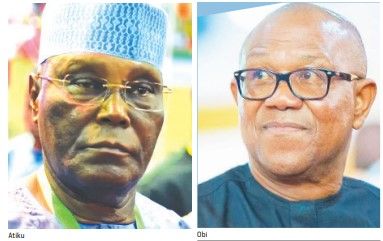I have heard calls for the opposition parties to come together to defeat Tinubu, but let us be honest, many of these parties are built around individuals, both the All Progressives Congress (APC) and Peoples Democratic Party (PDP). Take the formation of the APC in 2013.
It came about from the merger of Nigeria’s three largest opposition parties. The Action Congress of Nigeria (ACN), Congress for Progressive Change (CPC), and All Nigeria Peoples Party (ANPP), alongside a breakaway faction of the All Progressives Grand Alliance (APGA).
These parties had governors, which was crucial. In November 2013, five serving governors from the PDP defected to the APC. Rotimi Amaechi of Rivers, Abdulfatah Ahmed of Kwara, Rabiu Kwankwaso of Kano, Murtala Nyako of Adamawa and Aliyu Wamakko of Sokoto.
Unknowingly to Atiku Abubakar, the walkout led by him during PDP convention was the moment his political ambition hit a dead end. In the 2015 presidential poll, the “New PDP” states delivered a massive 3,322,010 votes to Muhammadu Buhari, who defeated Jonathan by 2,571,758 votes.
Without this group, the APC and Buhari would have lost. So, it is not enough for the opposition to simply unite, they need to secure at least seven APC governors. Anything less, they are merely engaging in a game of musical chairs with no real substance.
If they are serious about change, they need to win over key APC figures. Which change are we talking about? Now, let us talk about Atiku. He’s so power-hungry and self-centred that it is almost laughable. He dreams of ruling Nigeria, but the reality is, he will never get close to that office.
He is a politician who has been outmanoeuvred far too many times and seems incapable of understanding the wider national interest beyond his own ambitions. Peter Obi, my friend, doesn’t fully grasp Nigeria’s geo-political reality.
In 1979, Papa Obafemi Awolowo, running for the presidency under the Unity Party of Nigeria (UPN), picked an Igbo man, Dr. Philip Umeadi, as his running mate and Papa Awolowo was both the party’s presidential candidate and national chairman.
This made the party vulnerable in the North, as it was seen as a predominantly Christian party. In 1983, however, Awolowo understood the dynamics better and chose Alhaji Kura from the North. The national chairman of Labour Party, a Christian from the SouthSouth, is a big minus. LP should have considered the wider political landscape before making such a decision.
This is a political game of strategy, not just idealism. The Labour Party is certainly not representative of Nigeria’s diverse religious and ethnic makeup, which limits Obi’s chances of winning. He needs to broaden his political base if he hopes to succeed.
Currently, he doesn’t have a party since he doesn’t belong to the Abure LP faction, which is lawfully recognised. Lastly, let’s touch on the idea of Dr. Akinwumi Adesina of the African Development Bank (AfDB) running in 2027. He’s certainly qualified and I was among those who encouraged him to contest in 2023.
But we were told he collected the form, and then it ended there. I highly doubt any serious Yoruba man would contest against President Bola Tinubu in 2027. Why? Not because Tinubu is the most intelligent or educated, far from it, but because of the political realities on the ground. At the end of the day, it is all about power dynamics and who holds the strings.
So, the opposition must get their act together and realise that it is not about just uniting for the sake of unity. It is about securing strategic alliances with key political figures, particularly within the APC. Without that, the opposition is doomed to repeat its past mistakes.















